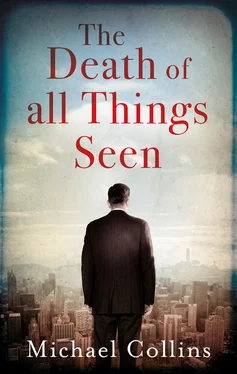*
Norman pissed into a chemical swill of aqua dye that sloshed with clots of shit and toilet paper. The mirror was a distorted sheet of metal, not a mirror in the real sense, because nobody on a Greyhound bus could be trusted to see the real self.
The bus turned onto a county road, meandering through a series of abandoned storage buildings along a curve of river. In the distance, Norman stared as the arm of a giant silo swung out over a glint of river the color of mercury. He had his face against the warmth of glass.
There had been a bustle of trade here once. He was aware of it. At a point in the distant past, those who lived here had stood on the side of the Union, when the issue of slavery and the rights of men held, when great sacrifice had been called for and blood had been spilt and families torn asunder in the cause of Freedom.
It stirred something within him. He sat upright. Yes, minds here had settled important issues, because places like this were more vibrant and alive a century before.
Of course, progress was not uniform, and what rose in one place caused a death elsewhere, so, here, the prospect of a livelihood gained from a host of associated industries — barrel making, a forge for making plows, fixing wheels, a feed store, a barber, a general store, all the necessities of life — disappeared. It was sad to give witness to its death.
At an intersection, a pickup truck pulled alongside. Norman could see a rifle mounted across the rear cab window, and a hunting dog sentinel beside its owner on bench-style seating. It accounted for a way of life, as much a part of the American experience as its greatness.
IN THE GREY dark of his hotel room, Nate was inclined to understand how a Holy War, or the idea of a suicide bombing, its conception and then the commitment to it, might be better sustained by staying in a hotel room, in a bewildering disorientation with a minibar charging six dollars for a bottle of water.
He regretted the thought. He was not thinking straight.
*
Nate had the film reels. He had received them at the Law Office of Weatherly, Sutherland, and Saunders, all three present at an office skyrise with varnished trim, leather-back chairs and an ornate throw rug.
Collectively, all three had looked like the three pigs had finally gotten it right and forsaken the shoddy construction of straw and stick houses. Their names were embossed in gold lettering across the entrance. A glass elevator soundlessly arrived on the floor and opened. Nate stepped out onto the tiled expanse of a marbled floor.
In coming south he felt a greater awareness of distance and how time imposed itself that he had not experienced in the hideaway of his life with Ursula, where the seasonality dictated an easier, more rote existence, perhaps no less tied to time, but there was a sense now he was moving against a clock.
He had a time-stamp from the garage where his car was parked. The first hour was thirty-six dollars, and it went up from there, — this on top of the valet parking fee at The Drake. The car was gathering a great expense in just existing.
He didn’t like the feeling, how money was made while nothing was being created, how an empty space could account for so much on the ledger of some accounting book somewhere, but it could, and did.
A beautiful Latino secretary with almond-shaped eyes reminded Nate instantaneously of Ursula, her skin tone the same, her hair similarly long, but she wore too much lipstick, and she was in high heels and a short skirt.
She was a great distraction. She looked past him while he waited, while the lawyers, in the custom of selling their time, talked among one another, checking their watches before the appointed time Nate was expected. He was ten minutes early, so Nate waited, and they waited, as though he didn’t exist.
The secretary might have been an incarnation of Ursula, but, in this life, Nate didn’t matter in the way he had previously. It struck him how a life moved through cycles, the realities of what you might have, what you had, what you lost, and what you would never have again. He felt a stabbing pain where it hurt nearly always now.
The three lawyers had a decided opinion about Norman Price. Helen Price’s last will and testament had been harder to execute, given Norman Price’s unwillingness to serve as executor. A small fortune was lost on associated legal documents.
It seemed a quibble and strange that any one lawyer, let alone all three, Weatherly, Sutherland, and Saunders were concerned with what was a minor legal matter, given the grandeur of their office and the clientele they represented. The reels were the last disbursement associated with the will.
It had taken time to track Nate Feldman. According to Weatherly, the law office had hired a private investigative agency. It was through documents connected with the sale of Nate’s organics business, specifically, the uncovering of an outstanding IRS bill for unpaid capital gains that led to Nate being located in Canada.
The law office prided itself on its thoroughness and professionalism. They had a facsimile of the bill from the IRS and Nate’s social security number printed in block lettering. Weatherly went about handing the facsimile over. Nate had the presence of mind not to take receivership of it. He knew enough about the law.
It was apparent then, Weatherly, Sutherland, and Saunders, all three, were Nate’s age. What they wanted was to have it known that they had served with distinction in the US military during the Vietnam War. It seemed principally for the benefit of the Latino secretary. Perhaps she didn’t fully understand their collective sacrifice. Their military pictures were mounted alongside their law degrees and an American flag.
There was an IRS statute that all American citizens living abroad were required to pay US taxes. Sutherland pointedly asked, ‘Are you a US citizen still?’
Nate politely refused to answer. He felt a grave and sudden danger that this had been a grand trap to bring him back to America. It turned out not to be the case. Weatherly, Sutherland, and Saunders were just asserting their collective history. It was that simple.
The terms of Helen’s will as pertaining to him was read, the minutes taken by the Latino secretary. The lawyers dispersed to their various palatial offices. Appointments were lined up. Each office was almost identical. Each looked out on the city in the great expanse of glass and light amidst the upper-reaches of the other skyscrapers.
It proved a powerful and evocative sight, reminding Nate of his father’s office, and how hard it was to scale to such heights, and that, after the day schools and the great promise he had shown early, he lived now in the shadow of a hill by a lake six hours northwest of Toronto. It was not so much a lament, as a fact.
The Latino secretary executed the release of the reels as Nate went about signing the forms, but then hesitated. He first read the disclosure statement with the distinct fear that, if he didn’t do so, he might have been signing some document of admission, some legal statement of guilt.
The Latino secretary was on the phone. Moments later another Hispanic woman, less pretty and older, appeared from a back office. A conversation, the entirety of it, was conducted in Spanish, so Nate was a stranger, twice removed in his own country.
It would be a few minutes longer, the Latino secretary advised him. He was obliging, cordial and enamored with her. He recalled again the same breathless anticipation of how he had used to sit in advance of Ursula serving him, before she had arrived at his cabin with her rhubarb pie.
It was strange, how a history went two ways, this Latino’s run for the border, a history she might tell her children and grandchildren, while he had escaped America. He might have told her about Ursula and his own life, or how a beauty like hers shouldn’t be cheapened with lipstick, stockings and heels.
Читать дальше












